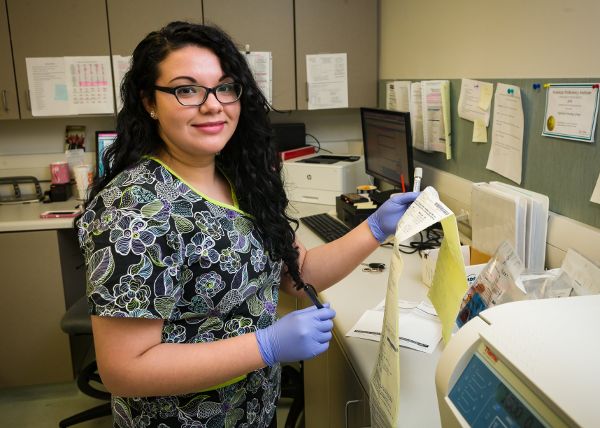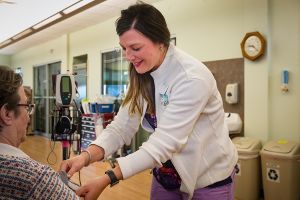

Join us for our Nutrition for Breast Cancer sessions
Registered Dietician led sessions on nutrition from diagnosis to treatment and survivorship. We welcome you to attend any of the sessions provided to learn more and ask pertinent questions related to your nutritional health.
Week 1: Nutrition After Diagnosis
An introduction to the role of nutrition in cancer care, focusing on maintaining a healthy weight, meeting essential nutrient needs, and dispelling common nutrition myths.
Week 2: Nutrition During Treatment
Guidance on managing treatment-related side effects through nutrition, preparing for surgery, and understanding the safe use of supplements to support healing and energy.
Week 3: Nutrition for Survivorship
Evidence-based strategies to reduce recurrence risk and promote long-term health through balanced eating, bone support, and whole-food nutrition.
Nutrition for Breast Cancer Class RSVP
Nutrition Before Treatment Begins
When you see your doctor, you will be asked about the medications you are currently taking. It is important to include all vitamins, minerals, herbs, and supplements that you take. Mistakenly people view supplements, such as herbs, as “natural” and assume they are safe. However, many of these products are not regulated by the FDA; therefore, information is not available to determine potential adverse reactions associated with chemotherapy and radiation therapy.
Preparing Yourself for Cancer Treatment
Side effects from cancer treatment vary depending on the type, dose, and frequency of your specific treatment. Most side effects are temporary and can be minimized and controlled. Maintaining good nutrition will help you better tolerate your treatment, the side effects, and overall, do better.
Have a Purpose to Eat
It is important to stay nourished during treatment allowing your body to heal, repair and replenish. There may be times when you do not feel like eating.
It is easy to get in a “food rut” by eating the same limited selections over and over, for example, “Meatloaf Monday”, or you may have your shopping list memorized and never try anything new. However, increasing the variety of foods you consume allows eating to be more enticing, enjoyable, and nourishing. Explore the store!
A Registered Dietitian is available at Highlands Oncology. Monthly groups are offered at no charge. You will learn simple meal and snack preparation ideas, eating strategies to cope with potential side effects and practical nutrition information.
Plan Ahead
- Keep a well-stocked kitchen.
- Keep grab and go snacks.
- Have food on hand that is simple to prepare for meals.
- The website Meal Train is available for family and friends to schedule a time to bring a meal to your home. Friends and family want to help. Do not be shy about asking for assistance with shopping, meal preparation, or setting up a Meal Train.
Benefits of Good Nutrition During Cancer Treatment
- Feel better.
- Improved strength and energy.
- Maintain your weight and your body’s store of nutrients.
- Better toleration of side-effects.
- Lowered risk of infection.
- Heal and recover faster.
Nutrition Facts
Carbohydrates
- Carbohydrates are the body’s major source of energy. The best sources of carbohydrates are dairy, fruits, vegetables, and whole grains. Carbohydrates also supply needed vitamins and minerals, fiber, and phytonutrients to the body’s cells.
- Whole grains are found in cereals, bread, flour, crackers, and starchy vegetables. When choosing a whole-grain product, look for the words “whole grain,” “stone-ground,” “whole ground”, or whole wheat flour.”
- Fiber is the part of plant foods that the body cannot digest. There are 2 types of fiber. Insoluble fiber helps to move food waste out of the body quickly, and soluble fiber binds with water in the stool to help keep stool soft.
- Other sources of carbohydrates include desserts, candy, and drinks with sugar. These provide calories and very few nutrients.
Protein
- Protein is needed for growth, repair of body tissue, and strengthening of the immune system. When your body does not get enough calories, it uses muscle as a source of fuel. This delays recovery of illness and lowers resistance to infection.
- People with cancer may need more protein to heal and resist infection. Good sources of protein include fish, poultry, lean red meat, eggs, low-fat dairy products, nuts, legumes, peas and lentils, and soy foods.
Fat
•Fats play an important role in nutrition. Fats & oils are rich sources of energy for the body. The body breaks down fats and uses them to store energy, insulate body tissues, and transport some types of vitamins through the blood.
- Choose healthy, unsaturated fats more often than saturated fats.
- Monounsaturated fat olive, canola, and peanut oils.
- Polyunsaturated fat safflower, sunflower, corn, flaxseed, and seafood.
- Saturated fats are mainly found in animal sources like meat and poultry, whole or reduced-fat dairy products. Some vegetable oils like coconut, palm kernel oil, and palm oil are saturated. Saturated fats can raise cholesterol and increase your risk for heart disease. Less than 10% of your calories should come from saturated fat.
Water
- Water is vital to health. All body cells need water to function. If you do not take in enough fluids or if you lose fluids through vomiting or diarrhea, you can become dehydrated. If this happens, the fluids and minerals that help keep your body working can become out of balance.
- You do get some water from the foods you eat, but a person should drink half your body weight in ounces of liquid each day. You may need extra fluids if you are having fever, vomiting or have diarrhea. Keep in mind that all liquids (soups, milk, even ice cream and gelatin) count toward your fluid goals.
Vitamins and minerals
- Vitamins and minerals are essential nutrients that our bodies require for normal function and development. They aid in many important processes, such as metabolism, healing and cell / organ function. Most are found naturally in foods. Individuals may also have special nutrient needs based on age, disease, medications, etc.
- A person who eats a balanced diet with enough calories usually gets plenty of vitamins and minerals. But it can be hard to eat a balanced diet when you are being treated for cancer. If you take a multivitamin, select one with no more than 100% of the Daily Value of vitamins and minerals and one without iron.
Managing Eating Problems During Treatment
All methods of cancer treatment, whether radiation, chemotherapy, hormone therapy, or biotherapy, target fast-growing cancer cells. Fast-growing healthy cells in the mouth, digestive tract, and hair are also affected by cancer treatments. The damage to healthy cells may produce unpleasant side effects that can cause problems eating.
You may have “dietary restrictions” that influence what and when you eat. Cancer treatment becomes a temporary “new norm” and eating needs to be adapted to ensure you stay nourished. In other words, there may be a day when it is beneficial to have a milkshake for breakfast, which means liberalizing your diet to meet your body’s nutritional needs.
Here are some things to keep in mind if you have days when you just do not feel like eating:
- Try to eat meals and snacks with enough protein, carbohydrates, and calories to maintain your strength, prevent muscle loss, and rebuild tissue that cancer treatment may harm.
- Try to eat within the first two hours after waking up.
- Eat 6 to 8 small meals and snacks, or every few hours. If you are unable to size meals, eat regular meals.
- Try to eat even though you are not hungry. Consider a nutritional supplement such as (Ensure, Boost, Carnation Instant Breakfast, etc.) if you are not interested in eating.
- If you can eat only one or two things, stick with them until you are able to eat other foods.
- If there are days you cannot eat, do not worry about it. However, start eating again as soon as you can, and let your doctor or nurse know if this problem does not get better in a couple of days. Try sipping a nutrition supplement throughout the day to provide nutrients and hydration.
- Stay hydrated. Drink fluids on those days when you do not feel like eating. Try non-caffeinated clear liquids, such as bouillon, clear broth, Sprite or ginger ale, fruit drinks, Jell-O, popsicles, or sports drinks. Or try full liquids, such as juices and nectars, creamed soups, yogurt, milk, milkshakes, sherbet, ice cream, custards, vegetable juice, and puddings. FYI: Pale urine is a good indication that you are well hydrated, but this can be affected by certain medications or supplements as well.
After Cancer Treatment Ends
Most eating-related side effects go away after cancer treatment ends. If you experienced side effects that impacted your ability to eat, you will gradually begin to feel better, and your interest in food will return. This is the time to start thinking about maintaining a healthy diet high in fruits, vegetables, and whole grains, and low in red meat, processed meat, refined sugar, and trans-fat and saturated fat.
Plant-based foods are healthy choices:
- Create a plate that has 2/3 or more of fruits, vegetables, whole grains, beans, nuts and/or seeds, and 1/3 or less of lean protein.
- Eat a minimum of five servings of fruit and vegetables a day. Choose a variety of different colors. Eat more vegetables than fruits.
- Choose whole-grain bread and cereal, brown rice, barley, oats, and legumes.
- Carbohydrates are a good source of vitamins, minerals, fiber, and phytochemicals. Plus, they add crunch and color.
Protein sources:
- Choose lean protein sources, such as fish and poultry.
- Eat fatty fish, such as salmon or tuna twice a week.
- Limit red meat. Eat no more than 18 ounces each week.
- Avoid processed meats, such as sandwich meats, ham, bacon, hot dogs, and sausage.
- Protein provides satiety because it stays in the stomach longer than carbohydrates.
Limit sugary drinks and processed foods:
- Choose water instead of soda, sweet tea, fruit juice, and energy drinks. They are high in calories and low in nutrients.
- Limit foods high in sugar and fat such as desserts and chips.
- Limit fast foods and fried foods.
Limit alcohol intake:
- Limit intake to one drink per day for women
- Limit intake to two drinks per day for men
- A drink = 2 ounces of liquor, 6 ounces of wine, or 8 ounces of beer
Stay well hydrated:
- Drink water.
- A good indicator of being hydrated is pale urine.
- Mild dehydration can cause fatigue and be confused with hunger.
- Sip your way through the day.
Supplements:
- Food is the best source of vitamins and minerals.
- You may take multivitamins.
- Take a calcium supplement twice daily for bone health. Select a supplement with 500 mg calcium and vitamin D 400 to 500 IU.
Weight Management:
- Achieve and maintain healthy body weight.
- Know your BMI (body mass index):
- Less than 18.5 Underweight
- 18.5 to 24.9 Ideal body weight
- 25 to 29.9 Overweight
- 30 or greater Obese
- Pay attention to the fit of your clothing and natural movement.
- Weight gain and being overweight or obese can increase the risk of cancer recurrence. If you have gained weight, losing weight may lower your risk.
- Eat slow, pay attention to portion size, and eat based on hunger not emotions, boredom, habit, etc.
- Move more throughout the day or exercise routinely, as tolerated.
- Limit foods high in calories, fat, and sugar, such as desserts, fried foods, and fast
- Know your BMI (body mass index):
Have a healthy perspective:
- The goal is to develop a healthy eating style with strategy.
- It is a process that takes place over time.







